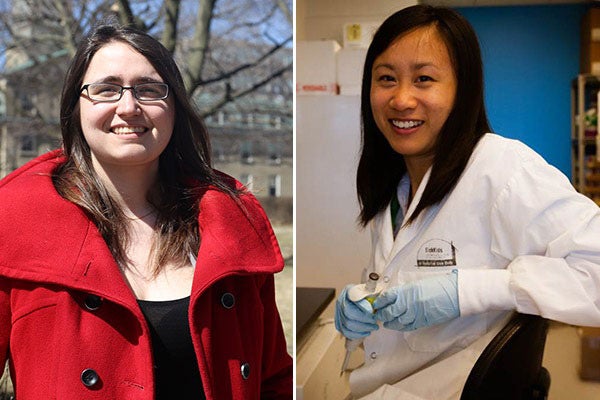
Two to watch: meet Convocation 2014's health leaders
Published: June 23, 2014
More than 12,500 students crossed the stage at Convocation Hall this June to receive their hard-won undergraduate or graduate degrees, and join the ranks of the University of Toronto's more than half a million alumni around the world.
That's more than 12,500 unique stories of dedication, struggle, creativity and triumph to celebrate - from those who held part-time or even full-time jobs while studying, to those who juggled family and volunteer responsibilities, launched their own companies, or published leading research.
While most of those stories will only be shared among family, friends, classmates and mentors, U of T News asked faculty and staff for their suggestions of grads who are global citizens, health leaders, community builders, entrepreneurs, education leaders and city builders to watch in the years to come.
Below, writer Michael Kennedy shares some of the stories of U of T's future health leaders.
————————————————————————————————————————————————
Ada Chan isn’t the type of student who brags about her accomplishments – but they’re impressive and numerous.
 Chan graduated with a Bachelor’s of Science with High Distinction, tutored undergraduate chemistry students for three years, volunteered at neighbourhood hospitals and was crowned U of T Idol 2013.
Chan graduated with a Bachelor’s of Science with High Distinction, tutored undergraduate chemistry students for three years, volunteered at neighbourhood hospitals and was crowned U of T Idol 2013.
But her most memorable experience at U of T was the satisfaction she got out from tutoring.
“I was really motivated to do this because I could relate to the struggles other students were experiencing and I was able to pass on the techniques that really helped me learn university-level chemistry instead of just memorizing it,” says Chan. “Not only did I strive to make the learning environment engaging for the students, I really enjoyed adapting my teaching methods to fit individual student needs and solve new problems.”
Chan was able to apply the knowledge she gained from tutoring to a Research Opportunity Project investigating factors involved during the transition from high-school to university-level chemistry.
This fall Ada Chan will begin graduate studies at U of T’s Department of Molecular Genetics, where she will focus on genetic testing and improving gene therapy.
She is currently working at SickKids Hospital with Dr. Johanna Rommens on a gene that modifies the severity of cystic fibrosis.
“This project will help us understand more about the disease and hopefully improve current cystic fibrosis therapies,” says Chan.
It's research opportunities like this that stand out among the experiences Chan has found invaluable during her undergraduate studies. She credits these opportunities for enriching her years at U of T and contributing to her newfound holistic approach to situations.
“But I think the most significant experience I’ve had at U of T was learning to get outside of my comfort zone when a friend pushed me to perform at a Hart House open mic night,” says Chan. “Without that push, I wouldn’t have taken the chance to compete in U of T Idol!”
Not to mention winning.
————————————————————————————————————————————————
At 22 years young, Alina Guna isn’t wasting any time before starting her research on the ageing brain.
 Last week, Guna graduated with an Honors Bachelors of Science with a Specialist in Neuroscience and a Major in Cell and Molecular Biology. Later this summer, she moves to England to begin her PhD in biological science at the University of Cambridge as a Gates Scholar.
Last week, Guna graduated with an Honors Bachelors of Science with a Specialist in Neuroscience and a Major in Cell and Molecular Biology. Later this summer, she moves to England to begin her PhD in biological science at the University of Cambridge as a Gates Scholar.
Guna didn’t always know she wanted to study neurodegenerative diseases, but she knew she wanted to be a U of T student.
“U of T distinguishes itself by having a breadth of research opportunities available to its students,” says Guna. “Initially, I was unsure about what I wanted to study – but I knew I wanted to conduct hands-on research.
“U of T was ideal because it is invested in its students and supports their academic endeavors.”
That investment provided Guna with exciting and practical research opportunities. Her most memorable experiences include building MRI coils to image the blood brain barrier and studying the function and inner workings of plants’ first line of defense against bacteria - the plant innate immune system.
Before leaving for Cambridge this summer, Guna is furthering her understanding of neurodegenerative diseases at the Centre for Addiction and Mental Health. She’s now working with Dr. Anne Bassett, a Canada Research Chair and internationally renowned expert in the field. The team is studying a cohort of patients with 22q11.2 deletion syndrome, a neurological disorder that has been found to lead to early onset Parkinson’s disease.
Guna’s advice to incoming U of T students? Don’t be afraid of your desires or potential.
“When you first get here everything is so big and imposing and it’s easy to get lost in the shuffle,” says Guna – but play it cool.
“University is a place where you can explore who you are and what you like. If something catches your fancy do it. Don’t think too much about how it will affect your future or if you feel it’s the right thing.”



